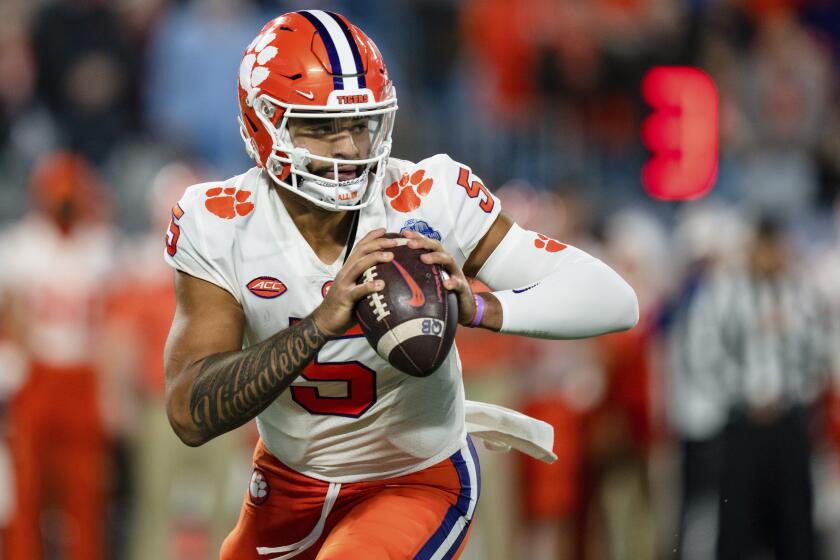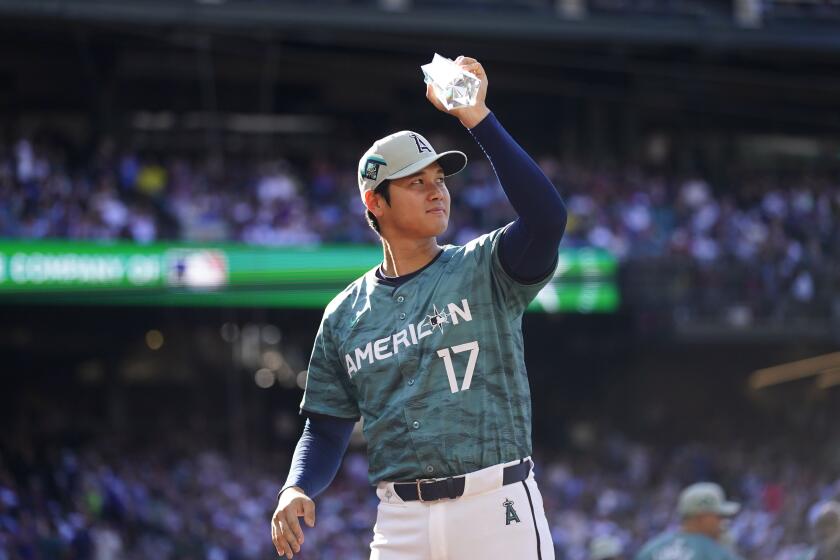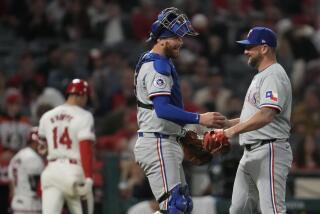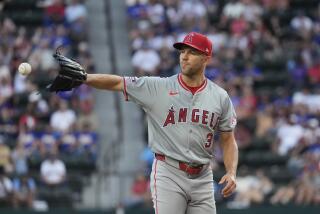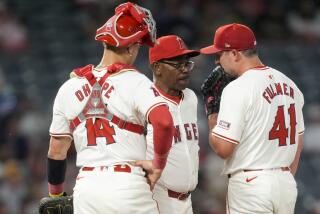How did Rangers’ sudden rise begin? It starts with Corey Seager
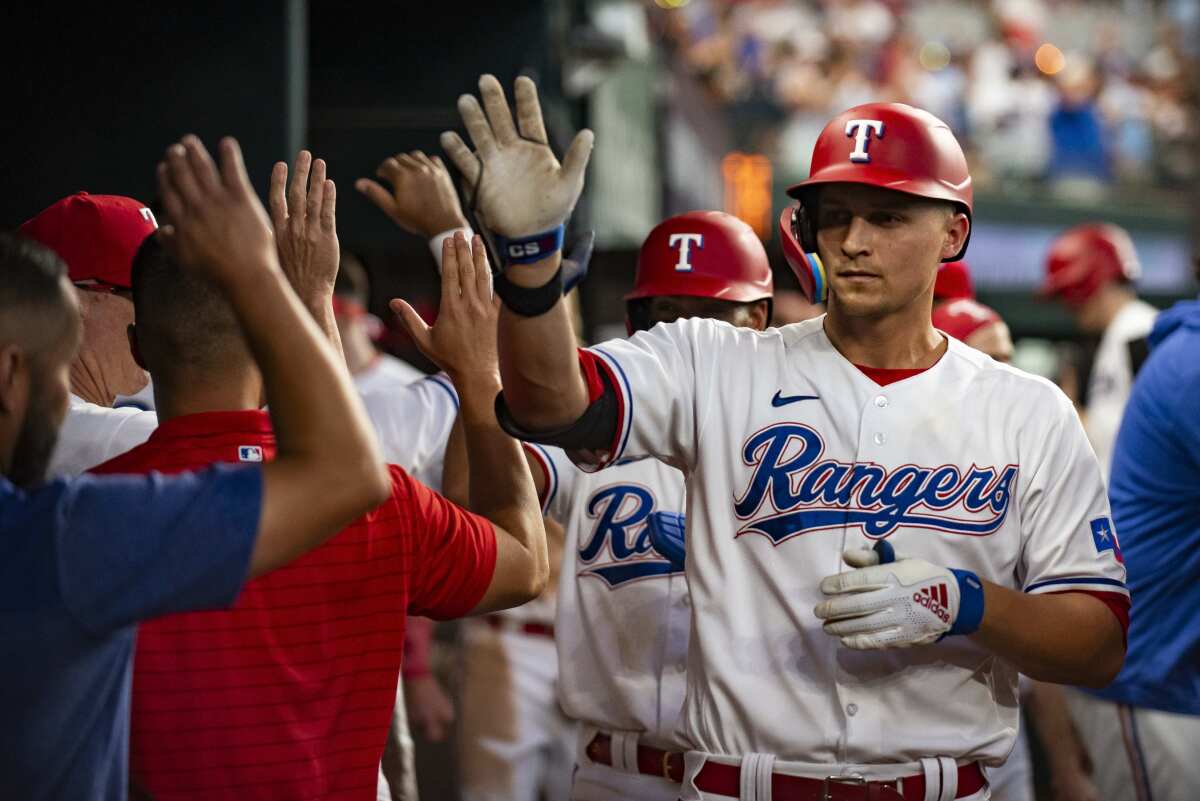
- Share via
SEATTLE — Corey Seager knew only winning when he left the Dodgers to sign a $325-million contract with the Texas Rangers two offseasons ago. Losing was foreign to the shortstop. Then last year happened.
The Rangers lost 94 games. They fired manager Chris Woodward after four dreadful seasons. The $556 million they committed to Seager, second baseman Marcus Semien, and starting pitcher Jon Gray the previous winter appeared foolish.
“I think it was a big learning curve for us, you know?” Seager said.
The excruciating lesson, a winter focused on improving the starting rotation, and the surprise hiring of Bruce Bochy as manager have produced a swift turnaround. The Rangers entered the All-Star break atop the American League West with a 52-39 record, the sixth-best mark in the majors and two games ahead of the Houston Astros. Their plus-148 run differential is second across the big leagues, one run behind the Tampa Bay Rays. They’ve scored 25 more runs than any other club.
The success was on display at Tuesday’s All-Star Game with five Rangers in the starting lineup — the most for a team since the 1976 Cincinnati Reds. That year, the Big Red Machine was 7-0 in the postseason, sweeping the New York Yankees to win their second consecutive World Series title. Just reaching the playoffs would be an accomplishment for the Rangers. They haven’t done that since 2016.
“As a player, that’s all you can really ask for, is getting that opportunity to go out on the field and win every day,” said Rangers catcher Jonah Heim, one of the team’s five All-Star starters and six overall. “So, we’re excited with where we’re at right now; there’s a lot of baseball to be played left.”
With their final pick on Tuesday, the Dodgers selected Oregon State’s DJ Uiagalelei, who showed promise as a high school pitcher.
The Rangers’ rapid rise could alter the major league landscape. Armed with a new ballpark (featuring an essential retractable roof), an owner willing to spend money, and a top-five market popular among baseball players, the Rangers could become a destination for top talent. One possible recruit this offseason? Clayton Kershaw, who was open about deciding between re-signing with the Dodgers or going home to play for the Rangers before last season.
“I think [it’s become a destination],” said Semien, the AL starting second baseman. “A lot of my former teammates ask me how it is here. I tell them it’s great. I was able to move my family out to Texas too. I think it’s very desirable for players who have families.
“And we’re playing for Bruce Bochy, who’s one of the best in the game. Our general manager played. I played against [general manager] Chris Young. So he’s a guy who understands what we’re going through and where we’re headed. And we have ownership aligned with wanting to win a championship, so it’s a good place to be right now.”
The Rangers’ plan for sustained success starts with Seager.
The 29-year-old cornerstone was already regarded as an elite hitter in his seven years with the Dodgers. He won rookie of the year. He was chosen for two All-Star Games. He was named World Series most valuable player, making himself feel at home at Globe Life Field two years before it became home. There would have been more accolades if not for injuries.
But this season is, so far, the best statistical campaign of his career.

Boosted by shift restrictions that have helped left-handed hitters around the majors, Seager is batting .353 with 12 home runs and a 1.026 on-base-plus-slugging percentage in 59 games. His 3.9 bWAR is tops on the club despite his missing more than a month because of a hamstring injury. If not for Shohei Ohtani’s dominance, he would certainly be in the AL MVP conversation after batting .245 with a .772 OPS last season.
“Having him, it’s a confidence boost for the lineup,” Rangers All-Star third baseman Josh Jung said. “It’s like, ‘Corey’s smoking the ball around. Why can’t we smoke the ball around?’ He’s getting on base, driving in runs. He missed, what, a month of the season? And he’s beating everyone in RBIs and doubles and all this stuff. So, it’s super crazy just to see how he goes about all his business.”
With Seager and Semien, the Rangers arguably have the best hitting middle infield in the majors. Heim is having a career year behind the plate. Adolis García, the AL starting right fielder, has 23 home runs. Jung has emerged as an elite third baseman at 25 years old.
On the pitching side, the Rangers have, for now at least, overcome the disappointment of losing ace Jacob deGrom — signed during the winter to a five-year, $185-million contract— for the season after just six starts.
Angels two-way star Shohei Ohtani commented on the fans and environment in Seattle during Tuesday’s MLB All-Star Game.
Nathan Eovaldi, also signed over the offseason, was the Rangers’ sixth All-Star after posting a 2.83 ERA across 18 starts. Gray (3.29 ERA) and Dane Dunning (2.84 ERA) have bolstered a rotation that absorbed disappointing first halves from veteran left-handers Martín Pérez and Andrew Heaney.
“Knowing what you need to change and being able to change it is a big thing,” Seager said. “And I think we did that. We addressed the pitching staff. Our position players got more time with each other and got more comfortable and we just kind of know what to do now.”
Seager knows championships aren’t won with regular-season success. He learned that in Los Angeles. But it’s the first step in proving the Rangers are for real — for now and for years to come.
More to Read
Go beyond the scoreboard
Get the latest on L.A.'s teams in the daily Sports Report newsletter.
You may occasionally receive promotional content from the Los Angeles Times.

